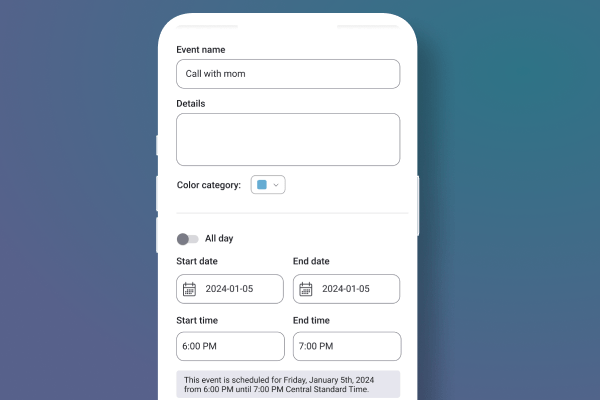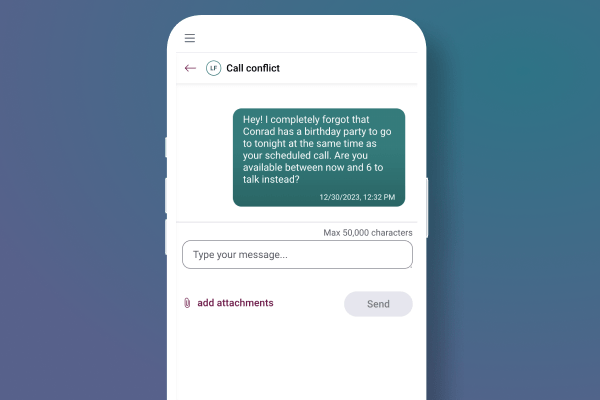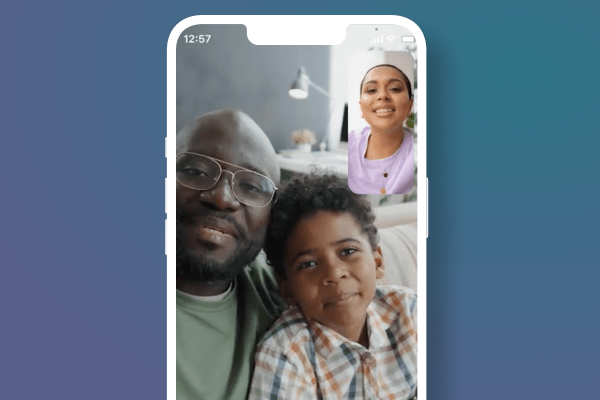Using TalkingParents for Virtual Visitation
How TalkingParents can help co-parents conduct virtual visitation.

With advancements in technology, family members, friends, and loved ones can keep in touch no matter where they are. For parents, being able to communicate digitally means being there for special moments or a random Tuesday night’s bedtime routine. This benefit is especially useful for co-parents with shared custody who live far away and want to stay in touch. Virtual visitation can be an alternative for parents who wish to stay connected with their children in any circumstance that makes in-person visits difficult or even impossible.
What is virtual visitation?
Also called “internet visitation” or “electronic visitation”, virtual visitation offers an alternative to traditional in-person visits. Like regular visitation, virtual visitation can be included in a parenting plan and set for specific frequencies and durations. Parents can communicate with their children through video calls using Zoom, Skype, FaceTime, or another video chat service. Virtual visitation can also be conducted through phone calls.
Using virtual visitation, parents can feel involved and present in their children’s lives without being physically present. Whether it’s reading a bedtime story at night or catching up on their school day, parents can engage with their children even if they’re halfway across the world.
Unless there are specific circumstances where in-person visitation is not in the child’s best interests, it’s essential to understand that virtual visitation is considered a supplement to physical visitation. Even though it is a helpful tool for co-parents who can’t accommodate in-person visits, virtual visitation should not replace traditional, face-to-face visitation time.
Who can use virtual visitation?
While the non-custodial parent typically requests virtual visitation if the custodial parent moves away, either parent involved in the shared parenting situation can ask for it. It can also be ordered when a parent wants to keep in touch with their children while they’re with their other parent for more extended periods.
Virtual visitation is especially beneficial for co-parents impacted by:
- Long-distance moves
- Military service deployments
- Incarceration
- Long-term vacations
- Custody schedules that aren’t 50/50
If co-parents and their children are impacted by domestic violence or child abuse, virtual visitation may be considered more harmful than helpful since any contact may negatively impact children. On the other hand, parents in high-conflict co-parenting situations may benefit from virtual visitation because face-to-face communication with each other is minimized or eliminated.
Will my state allow virtual visitation?
The states that have specific laws about virtual visitation include:
- Florida
- Illinois
- North Carolina
- Texas
- Utah
- Wisconsin
Even though it’s not dictated by law in most states, courts often recognize virtual visitation as a feasible option for co-parents as long as it benefits the child’s best interests. The court must edit the custody agreement and schedule to reflect their decision to allow virtual visitation, and the parents may have input on specific parameters related to virtual visitation to avoid conflict or confusion later.
Parents can request that virtual visitation be added through a parenting plan modification and decide on details like:
- What platform will be used
- When calls can take place
- Whether calls need to be scheduled
- How often calls can take place
- How long calls should last
How can TalkingParents help with virtual visitation?
As part of helping parents manage shared parenting and custody, TalkingParents is a co-parenting tool that’s an excellent platform for coordinating and conducting virtual visitation. Here are 3 ways our features support organized, efficient virtual visits between parents and their children.
1. Schedule calls on the Shared Calendar

It’s best to schedule your calls because your visitation may need to follow specific parameters detailed in your court-ordered parenting plan. By doing so, you and your co-parent can ensure your child gets the contact they need with whichever parent participates. Planning also helps eliminate any element of surprise or potential scheduling conflict that may interfere with the ability to conduct virtual visits.
With the Shared Calendar, parents can add and view events and notes to keep track of important dates, including virtual visits, in a single source that both parents can reference. If your visitation schedule is set at regular intervals, you can create a recurring event and have it repeated daily, weekly, or monthly. If you and your co-parent want to share specific information or special occasions with your child during an upcoming visit, you can include details in the event as a reminder.
2. Communicate updates through Secure Messaging

While consistency benefits parents and children in shared parenting situations, avoiding scheduling conflicts or changes is sometimes impossible. When an adjustment is needed for any reason, co-parents need a safe, secure way to communicate these changes, especially if they do not get along well. Because virtual visitation is in your child’s best interest, it’s imperative to share changes so visitation can still take place at another time. Additionally, repeatedly neglecting to accommodate changes to virtual visitation could be perceived as parenting time failures that can lead to court intervention.
Secure Messaging equips co-parents with a tool to send messages requesting changes to the visitation schedule or addressing other concerns that cannot be edited or deleted. Every message comes with a timestamp of when it was delivered to and read by the other person, so either parent always knows whether the other is aware of the proposed changes even without a response. Additionally, if a parent misses a call for visitation, they can send a message to give a quick update and still have that day’s visit.
3. Conduct video calls with Accountable Calling℠

Once the details are set and any changes are communicated, it’s time to get down to business and have your virtual visit through a video call. Video calls often facilitate better communication with your child because they can convey body language and tone of voice. While various platforms offer video-calling capabilities, almost none provide a way to have completely secure, documented calls. Many also require you to disclose a phone number or other direct contact information, which can be a dealbreaker for co-parents in high-conflict or parallel parenting situations who want to avoid unnecessary contact.
With Accountable Calling℠, co-parents can have peace of mind knowing they can make calls that do not disclose their personal information to their other parent. Either parent can initiate a video call and enable their child to connect with the other parent wherever they are, giving them the space to have face-to-face contact. Every phone and video call is recorded and comes with an automatically generated transcript, which is part of an Unalterable Record that both parents can access.
Using these features and many more, co-parents can use TalkingParents as their all-in-one shared parenting app to keep in touch with each other and their children. Whether it’s through virtual visitation with video calls or quick check-ins with phone calls or messages, our service provides the tools needed for any co-parenting situation. We help parents have transparent, accountable communication through a platform that minimizes confusion and lets parents focus more on their children.